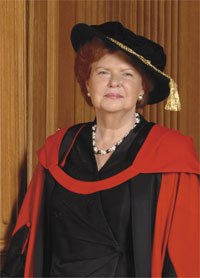 |
| Vaira Vike-Freiberga poses for her portrait during Convocation ceremonies last month. (Danny Abriel photo) |
When Vaira Vike-Freiberga arrived from her native Latvia for convocation ceremonies at ∫⁄¡œ≥‘πœÕ¯, she remembered what she missed so much about her adopted home: the beautiful colours of a Canadian fall.
‚ÄúI so miss the wonderful autumns, with blue skies and glowing trees of gold and bronze and copper,‚Äù she rhapsodized to an audience of ∫⁄¡œ≥‘πœÕ¯graduates in their black robes and caps. ‚ÄúIt uplifts the heart.‚Äù
Her first glimpse of Halifax was more than 50 years ago from the deck of a ship steaming toward Pier 21. Forced to flee her homeland during the Soviet occupation at the close of the Second World War, the young refugee girl gazed in wonder at Nova Scotia’s wooded hillsides.
“My little brother, who had been born in a refugee camp, asked, ‘Why does it look so strange? It’s all green,’” she recounted. “I realized that he had never seen a green hillside.”
Dr. Vike-Freiberga blossomed in her new home, earning a BA and MA from the University of Toronto and a PhD in experimental psychology from McGill University in 1965. She worked for many years as a professor in the Department of Psychology at the University of Montreal, authored 10 books and served on several scholarly boards, including the Social Science Council of Canada and the Canadian Psychological Association.
'He couldn't stop us'
As an immigrant – even one who speaks English and French (not to mention Latvian, German, and Spanish) – she says she didn’t fit in with Canadian politics. But that wasn’t true of academia, which she calls “a level playing field.” “Being a woman was not a barrier in science,” she explains, in an interview following the ceremony. “There was no one standing at the door, saying ‘You can’t get in.’ And, when there was, we didn’t listen. He couldn’t stop us.”
She spent 44 years in Canada. But after the Berlin Wall crumbled and Eastern Bloc countries emerged from their post-war deep freeze, Dr. Vike-Freiberga returned to Latvia as the director of the Latvian Institute. Just a few months later, she was elected President of Latvia by the Latvian Parliament, and served until July 2007.
During her presidency, Dr. Vike-Freiberga presided over significant changes in Latvia after the fall of communism. Domestically, she oversaw many political and economic reforms and helped Latvia to successfully transition from a totalitarian political-economic system to one with a full liberal democracy and a strong free market economy. She was also instrumental in the foreign policy realm. She took particular interest in championing Latvia’s return to the European family of nations through gaining full membership in the European Union and the North Atlantic Treaty Organization (NATO).
A democratic vision
It wasn’t easy. “After all those years behind the Iron Curtain, people had developed bad habits. After all, they had to survive in a hideous system. The attitude was, ‘That’s the way we are and there’s nothing that can be done about it.’ Well, that (kind of attitude) is the first thing to put behind you.”
Throughout her convocation address, Dr. Vike-Frieberga’s message revolved around respect for human rights, democracy and freedom, and the power of the human spirit. While presiding over great change in Latvia, she says Canada acted as her guiding inspiration. She urged young Canadians not to forget or take for granted how much they have, no matter how messy or complicated democracy can be.
“Canada’s high quality of life, democracy, and justice exist because great minds had a vision of what their country should look like.”
David J. Meadows is a doctoral candidate in political science at ∫⁄¡œ≥‘πœÕ¯specializing in the political economy and foreign economic policies of the former Eastern Bloc countries.
